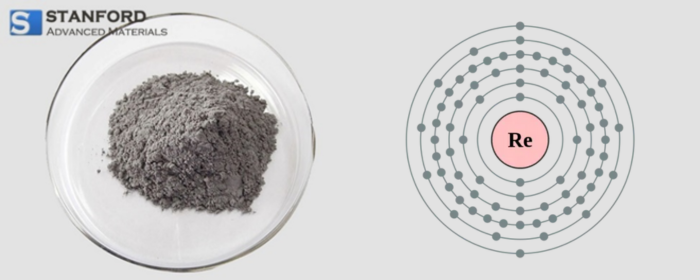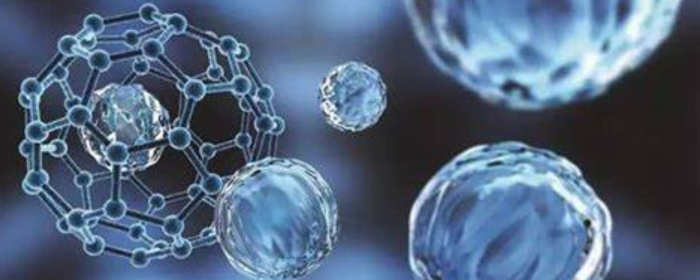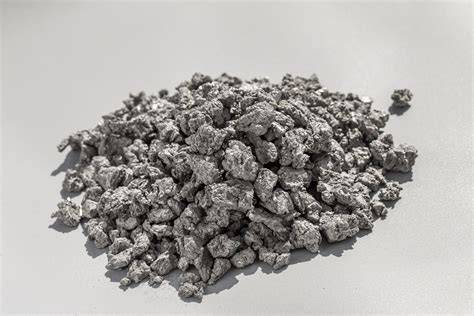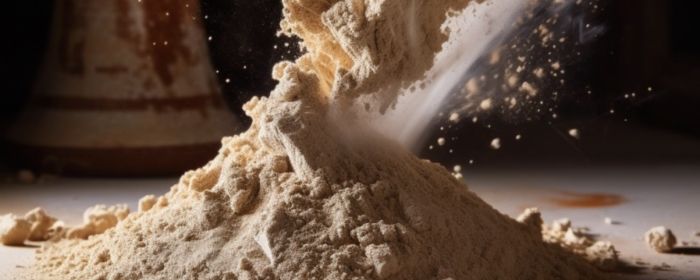The Rare Metallic Element: Rhenium
Rhenium is an extremely rare and dispersed metallic element on Earth, making it both expensive and costly to produce. Its industrial production began around 1950, first in the Soviet Union and later in the United States. Due to its late discovery, research on rhenium has been limited. Rhenium and its alloys are primarily used in aerospace components, solid propellant heat-sensitive elements, and anti-oxidation coatings. Rhenium powder, on the other hand, finds applications in high-temperature alloy manufacturing, catalysts, and nanomedicine.

Understanding Rhenium Powder
Rhenium powder has a hexagonal close-packed (hcp) crystal structure, characterized by tightly packed atoms and high bonding energy.[i] This structure grants rhenium an exceptionally high melting point (3186°C), second only to carbon (3550°C) and tungsten (3400°C), and the highest boiling point of all elements at 5596°C. Due to its large atomic mass and dense atomic packing, rhenium powder has a high density of 21.02 g/cm³.
In its powdered form, rhenium exhibits a high surface area and crystal defects, enhancing its reactivity and surface energy. However, these characteristics also result in lower mechanical strength for powdered rhenium.
Table 1. Rhenium Powder Properties
|
Property |
Value |
|
Relative Atomic Mass |
186.2 |
|
Density |
21.02 g/cm³ |
|
Melting Point |
3186°C |
|
Boiling Point |
5596°C |
|
Appearance |
Silvery-gray at room temperature |
|
Chemical Stability |
Moderately reactive |
[i] Youngmee Kim, Seon-Mi Park, Wonwoo Nam, Sung-Jin Kim, Chemical Communications, 2001, 1470, DOI: 10.1039/b104276a
Explore the Applications of Rhenium Powder
Rhenium powder is widely applied in producing high-temperature alloys, serving as a catalyst, and advancing nanomedicine.
--Additive for High-Temperature Alloys
The unique properties of rhenium powder—its high melting point, boiling point, and density—are attributed to its crystal structure and strong metallic bonds. These traits ensure it remains stable under extreme heat, exhibiting excellent resistance to creep and oxidation. Adding rhenium to metals such as tungsten, molybdenum, and chromium significantly enhances their high-temperature performance by modifying their microstructure and mechanical properties.
Table 2. High-Temperature Alloys and Function of Rhenium Addition
|
Alloy |
Function of Rhenium Addition |
|
|
Nickel-Based Alloys |
Rene 41、Rene N5、CMSX-4 |
Improves creep resistance and oxidation resistance |
|
Cobalt-Based Alloys |
Stellite series |
Enhances high-temperature strength and stability |
|
Single-Crystal Alloys |
CMSX-4, TMS series |
Increases fatigue performance and corrosion resistance |
|
Tungsten-Based Alloys |
W-Re |
Reduces brittleness and improves ductility |
|
Rhenium-Platinum Alloys |
- |
Enhances resistance to high-temperature oxidation |
Rhenium powder’s primary role in high-temperature alloy production lies in boosting material strength, creep resistance, and oxidation resistance, enabling these alloys to excel in extreme environments.
Rhenium-based high-temperature alloys are widely used in critical components of aircraft and rockets, such as combustion chambers, turbine blades, exhaust nozzles, and jet engines. They also play a key role in thermal power generators, gas turbines, nuclear fusion reactor linings, atomic reactor structures, and space station nuclear reactors.
.png)
--Efficient Catalyst
Rhenium powder’s electronic configuration ([Xe] 4f¹⁴5d⁵6s²) allows for multiple oxidation states, especially the highly active +7 state, which is advantageous in catalytic and chemical reactions.
Rhenium powder can be used to produce rhenium-platinum catalysts, which play a critical role in petroleum reforming and hydrogenation processes. The addition of rhenium powder significantly enhances the catalyst's sulfur resistance, selectivity, and lifespan, making it more efficient in the production of high-octane gasoline and aromatics.
Rhenium powder is also utilized in the preparation of rhenium oxide catalysts (such as Re₂O₇), which exhibit excellent activity in the selective oxidation of olefins. For example, it is used to catalyze the epoxidation of olefins to produce epoxides, which are important intermediates for fine chemicals and polymer materials.
Advantages of Rhenium Catalysts:
- Versatile oxidation states.
- High catalytic activity and resistance to deactivation at elevated temperatures.
- Long lifespan due to resistance to acid and base corrosion.
--Nanomedicine and Drug Applications
Rhenium powder holds significant potential in precision medicine, targeted therapy, and diagnostic imaging, driving advancements in nanomedicine and nuclear medicine.
Through nuclear reactions or irradiation, rhenium powder can generate radioactive isotopes such as Rhenium-186 and Rhenium-188. Rhenium-186 is used to alleviate pain caused by cancer-induced bone metastases, effectively relieving localized symptoms through its radiation. Rhenium-188 is applied in targeted drug delivery, precisely transporting radioactive substances to tumor sites while minimizing damage to healthy tissues.
Additionally, rhenium powder, when processed into nanoscale particles, can be used to create rhenium-based nanoparticles. These particles exhibit high biocompatibility and unique optical properties, making them valuable for biological imaging and photothermal therapy.

Conclusion
The exceptional properties and unique applications make rhenium powder a valuable material in high-temperature alloy production, catalytic processes, and nanomedicine. Despite its high cost and limited availability, rhenium’s contributions to advanced technologies—ranging from aerospace to medical treatments—underscore its importance for industries and research institutes seeking to push the boundaries of material performance and innovation.
Founded in 1994, Stanford Advanced Materials (SAM) is committed to providing first-class atomized metal alloy powders to customers in the commercial and industrial fields. SAM can provide you with Rhenium Powder with purity ≥99.99%, or 99.999%. If you are interested in other Rhenium alloy powders, such as Tungsten Rhenium Powder (W-26Re, W-5Re, W-25Re) and Molybdenum Rhenium Powder, welcome to Get A Quote.






.png)




